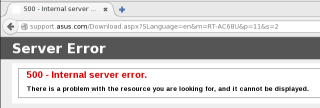Introduction
30 Jul 2015Some areas of my home were having WiFi reception problems, so it was time to get another device to address that. After reading quite a few online reviews, two contenders emerged: Asus RT-AC68U and Netgear R7000 NightHawk. After speaking to absolutely hopeless Netgear pre-sales support staff on multiple occasions, I decided to get Asus instead.
The device build quality seems quite solid. It certainly looks like a premium product. Its three antennas and vertical placement make it look far more "technical" than my other access point.
The hardware of this router is pretty much standard stuff. Five gigabit ethernet ports in AP mode. Dual band WiFi (2.4 and 5 GHz, with AC support). Linux under the hood.
Setup
These days router setup is usually a pretty straightforward affair, especially when actually used as an access point. This device was no different.
However, my attempt to update the firmware automatically on this device ended in misery. The update never completed and the device was stuck mid process, effectively unusable. I called Asus support to find the way out of this mess. Although quite courteous and apologetic, the fix didn't actually come from them. I simply downloaded the firmware manually and applied it using the manual process.
I later discovered why I had this problem. Asus support site (http://support.asus.com/) probably got the name because it is in desperate need of support, not because it provides support. I visited their site on many occasions after this incident and most times at least some requests will end in a 500 error. Sad. And just to be clear, these 500s have been coming from Asus support site for over a month now. I've told them about this, but it still hasn't been fixed. Below is a screenshot of such an error taken on 30 Jul 2015.

So, doing automatic firmware upgrades is a big no-no here.
Firmware comedy
Never mind the failed automatic firmware update. There is more! :-)
The firmware that was marked stable when I upgraded to it (3.0.0.4.378_6975) has been removed from the support site altogether. Instead, there is a new beta version, with fixes for Japan only. WTF?
The support staff told me over the phone that users should not upgrade the firmware. The manual claims the opposite. Huh?
Seriously, Asus, get your support site, staff and story straight!
Updates
6 Nov 2020: New firmware, version 3.0.0.4.386.40558. Feature release.
[...]
30 Jun 2020: New firmware, version 3.0.0.4.385.20630. Various security fixes.
[...]
6 May 2020: New firmware, version 3.0.0.4.385.20490. Connection stability improvements and other bug fixes
14 Apr 2020: New firmware, version 3.0.0.4.385.20433. QoS changes.
13 Mar 2020: New firmware, version 3.0.0.4.385.20253. Fix for CVE-2019-15126.
13 Feb 2020: New firmware, version 3.0.0.4.385.20252. Bug fixes.
26 Nov 2019: New firmware, version 3.0.0.4.385.10000. Bug fixes.
13 Nov 2019: New firmware, version 3.0.0.4.384.81351. Bug fixes.
[...]
13 Apr 2019: New firmware, version 3.0.0.4.384.45713. Bug fixes.
30 Mar 2019: New firmware, version 3.0.0.4.384.45708. Security fixes.
6 Dec 2018: New firmware, version 3.0.0.4.384.45159, works fine. Finally, minidlna does recognise MPEG2 files again.
19 Sep 2018: New firmware, version 3.0.0.4.384.32799, appears to mostly work fine. Just like many of the late versions, minidlna on it does not recognise perfectly valid MPEG2 files.
17 Aug 2018: New firmware, version 3.0.0.4.384.32738, appears to mostly work fine. Just like many of the late versions, minidlna on it does not recognise perfectly valid MPEG2 files.
10 Jul 2018: New firmware, version 3.0.0.4.384.21140, appears to mostly work fine. Just like many of the late versions, minidlna on it does not recognise perfectly valid MPEG2 files.
[...]
10 Nov 2017: New firmware, version 3.0.0.4.382.18547, appears to work fine. It fixes the nasty KRACK WiFi vulnerability.
[...]
14 Dec 2016: New firmware, version 3.0.0.4.380.4164, appears to work fine.
14 Jul 2016: New firmware, version 3.0.0.4.380.3831, includes some security fixes and appears to work fine.
16 May 2016: New firmware, version 3.0.0.4.380.3264, includes Samba security fixes and appears to work fine.
29 Jan 2016: New firmware, version 3.0.0.4.380.1842, appears to work fine.
14 Dec 2015: New firmware, version 3.0.0.4.380.1031, appears to work fine.
30 Oct 2015: New firmware, version 3.0.0.4.378.9313, appears to work fine.
30 Sep 2015: Two firmware versions were released in a relatively short time: 3.0.0.4.378.8258 and 3.0.0.4.378.9135. I am running the latter, which seems to work fine.
Functionality, performance
I don't really need anything overly complicated or sophisticated when it comes to WiFi. Basically, I just want it to work reliably (which is almost impossible with anything wireless - long live the humble cable!).
Given that criteria, this device is pretty solid. It did what I purchased it for - it made wireless signals in my home better.
The signals from the device are pretty strong, in line with what E4200v2 can muster. The ethernet does indeed reach gigabit speeds.
The web interface for managing the router is a bit confusing at times and many options are not properly explained. But, with enough persistence, it can be made to work well enough.
The built-in DLNA software (minidlna) is unreliable. Some perfectly valid MPEG2 files cannot be scanned and therefore do not appear in the database.
Conclusion
It seems that no matter which "premium" brand of wireless device one chooses, the support is going to suck. My experiences with Cisco, Netgear and now Asus all confirm that. If you are willing and able to provide your own support, then sure - the hardware seems decent enough.